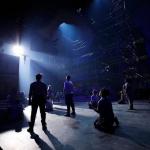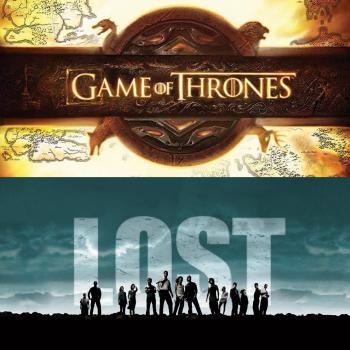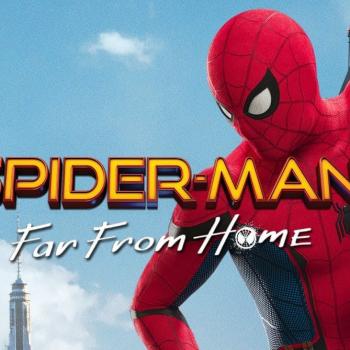
Last year, concurrent with Lent, I prepped and then underwent bariatric surgery. For those of you who may not know what this is: bariatric surgery is a means whereby the stomach is reduced to help a person lose a considerable amount of weight. Most people have heard of a gastric bypass, which is one form of the procedure, but I opted to get the newer “sleeve” which—rather than rerouting this intestine to that intestine and tying off this bit and reattaching it here, etc.—just cuts off the largest part of the stomach to leave you with a teeny-tiny tummy.
Which is to say, last year rather than me coming to Lent, Lent came in a huge way to me.
And, in some ways, hasn’t really left me.
‘Til now.
Life in the Desert
As I’ve written elsewhere, Lent has pretty much plagued me for the past four years: job changes, the living loss of people I loved, the deception of those I trusted—it’s been a doozy of a time. Of course, there have also been joys: the birth and growing up-ness of nieces and nephews, the deepening of old friendships and the discovery of new, artistic opportunities and the ability to offer opportunities to others. Weeds and wheat.
Like any desert time, the past four years have helped me shake off what should have never been mine: leaving jobs, lovers, friends who ate my soul and left me wounded.
Loss can be a good thing, too.
Yet facing bariatric surgery was a big one: it was the potential loss not of food, but of identity. Of a way I’d been. The very shape and silhouette of me.
The day I came back from the nutritionist, several months before my surgery, having just learned everything I would never be allowed to have again, I cried openly and unabashedly in front of bubbly German tourists on a bus. Yelling internally at God: “You’ve taken money from me, and you’ve taken sex from me, and you’ve taken friends from me…and now you’re going to take away ice cream?!?!?!?”
I chatted that night with my dear friend from high school on the phone, the one who’d given me the come to Jesus talk about my health. I complained to her what I hadn’t been able to verbalize in front of bubbly Germans, and she encouraged me to reframe the idea: it wasn’t that I was giving up ice cream, it was that I was being invited to experiment with new cuisines. And I hadn’t signed on the dotted line to be broken open yet; I could start the experiments now, learn if I could handle this new life before I committed to it.
Soon after, while two significant relationships imploded spectacularly over the course of the following months, I began changing my life. I tried cutting out carbs entirely, and nearly fainted. That was a no go. But the upping of protein, the eating slower, the increased hydration and decreased Diet Coke, the low-impact exercise all conspired to help me think that change was possible. The last gasp cruelty of one lover helped stiffen my resolve: he liked fat girls. Well, he could kiss this fat ass goodbye. I could shed him as easily as ice cream. I knew the desert well by then. I could live on less.
Living in Lent
When the time came to start my pre-op diet, I was prepared. Years of Good Fridays prepared me for a month of them: eating only one meal, half-portion, and two protein shakes and that is it for weeks. And then two days before the operation itself: white knuckling my way through a literal starvation diet. Drinking only clear liquids—water, and broth, and blue popsicles.
Ironically, I binged on The Great British Bake-Off. It wasn’t that I craved their delectables, but I savored their community. My friend’s mother sent me a coloring book. I listened to lambs bleat and bakers stress over proofing bread while I colored mandalas with a vengeance to take the edge off.
I ate meat all through that Lent. I never had an Easter. I was in recovery by then, and a friend brought me communion. Post-op was entirely liquid, so no chocolate or ham but tentatively sipped shake after tentatively sipped shake. The day I could stomach a Cheerio was a miracle. I graduated to fish, and grew tired of tuna, although there’s always an extra can of it somewhere. Meat returned, but not much, never too much. Eating was different now. Half a glass of wine could get me drunk. There was no point to fries.
The lover and false friend left. The weight came off, too. My wardrobe shrunk as I did. I gave away my clothes, clinging—it should be admitted—to my winter coats that swallowed me now, but were the last to go. I’d bought them dearly. This one still had bloodstains from when I fell headlong down the subway stairs two years before, thanks to slick snow on the unsalted steps. It had been my cousin’s birthday. It had been one of the last good days with the false lover. I tumbled down twice, breaking my glasses. I should have died. I didn’t. I should be paralyzed, scarred at least. I’m not. And the coat sustained a few bloodstains against the deep red wool—and it was hard to give this coat away. It’s gone now. It’s all gone now. All of it, all I was, all of me: gone.
It has been four years of Lent.
When the Bridegroom Comes
Typically, when Lent rolls around, I feel like a superstar. When my household sister at Steubenville were at odds, as a community we gave up singing harmony and literally learned unity. The year after I somersaulted down the subway steps and survived, I gave up being late for things. I realized it was a symptom of being afraid to love too deeply, if I was just a little late. I’ve always loved the discipline of Lent: the call to try more.
But this year, one year after surgery, Lent eluded me.
Ash Wednesday rolled around, and I realized fairly quickly after a year of listening to my body that the protein I could glean from fish and fasting wasn’t going to cut it. I decided standing on my feet was more important than falling over in the name of solidarity.
Significant money troubles came (as they always come—but this time, more severe), and I was forced to buy what I call “poor person food.” That is: pasta, mac and cheese, PB&J, bread…stuff that I can buy for a buck and survive. Sort of. Working with my therapist these past several months, I’ve realized that much of my own obesity was due not so much to an overindulgence in ice cream, but in living a life of extreme poverty. You’ll eat more mac and cheese because there’s almost no nutrition in it. You pay a buck to survive, but your body pays the price. Still: mid-Lent, this was all I could afford. And my body suddenly gained four pounds.
A Friday rolled around. I bought myself a $3 steak. And ate it, too.
The weight fell, my health rose, and I gave up fish Fridays for Lent.
The Passions of the Christ
Palm Sunday came with its passion.
Ever since learning about Triduum at Franciscan University of Steubenville, I’ve grown fond of attending the entirety of the mass, reveling in the solemn pageantry of reenacting the Last Supper, the Crucifixion, the Resurrection.
Yet this year I had been invited down to holiday with that dear high school friend over Easter weekend. We’d see Shakespeare plays, and revenge tragedies, and Restoration comedies, and stay in a Victorian mansion, and drink loads of honeyed tea, and walk up and down hills, and drive along mountains, and chat until the wee hours, and eat rich food (but not too much of it)—and make it to Easter mass—and then have tea with milk and honey and pleasant walks and talks again.
Since my friend was good enough to invite me to such a delightful holiday, naturally I said yes, although much like skipping fish, I felt a little odd about seeing Hamlet rather than going to Easter Vigil. Odd, but not restless, or un-at-peace.
I recalled the stories of that other Prince of Poverty, St. Francis himself who, it is rumored, would fast almost continuously unless he was invited to feast. And then he feasted, without making a fuss over it and embarrassing his hosts. I thought of the Pharisees chiding Christ’s Apostles as they ate, and Christ’s rebuttal about feasting with the Bridegroom.
I had some fish and chips on Good Friday. I almost couldn’t stomach it.
That evening I had turkey and bacon and felt better.
Yet it wasn’t until this morning, as I was reading my Magnificat, and paused to pray afterwards, that I heard Him, something like this:
ME. Hey, I hope—I mean, I probably had too much fun over Easter, eh? I didn’t sit with You in Your Passion.
HIM. You have been.
ME. Yeah, I know. But, like, especially this week.
HIM. Am I God?
ME. Yes.
HIM. Are you mine?
ME. Yes. Of course.
HIM. Do you belong to Me?
ME. Yes.
HIM.Then let me give you gifts, Wife. You please me more to receive them joyfully than to disdain them for some piety. You have been with me through the desert; now be with me at the banquet. Your fast is broken, child. Should you not feast with Me, if I have given you good things? Troubles will come again in season. But for now, rejoice! See, I AM doing something new.
Empty Tombs and Folded Cloths
It can be easier, as a Catholic, to believe there’s some especial holiness in only staying on this side of the tomb, of remaining forever at Calvary, of keeping Christ on His Cross. Of meditating on His Death, but never really allowing Him the Resurrection. Of fasting while He feasts.
This is what His Apostles did in the upper room and on the road to Emmaus. This is the lament of Job. “Have you not heard? Life is full of suffering, and only suffering.” Yet His response is, as Chesterton reminds us, great enough not only to encompass sorrow, but mirth.
Easter morning, my sister posted a video of her children running about the house on a search for their Easter baskets. I’d forgotten the simple joy of Easter morning as a child. I’d gotten so caught up with Mary weeping outside the tomb, that I wasn’t rejoicing at Christ in the garden. And sometimes we can cling so closely to His cross, we don’t notice that He stepped off it. We cling to the splinters we received, and won’t let Him pluck them from our hands, wipe the blood and fill our fingers full of rubies.
We are now in the Easter season. And I want to enjoin you to look not for Christ among the dead, but among the living. To open your hands not just to His wounded side, but to His wonder.
Christos anesti!
 Image courtesy of Pixabay.
Image courtesy of Pixabay.
Want to keep Emily in meat and getting healthy, as well as gain access to cool rewards? Become my patron for as little as $1/month on Patreon today!












